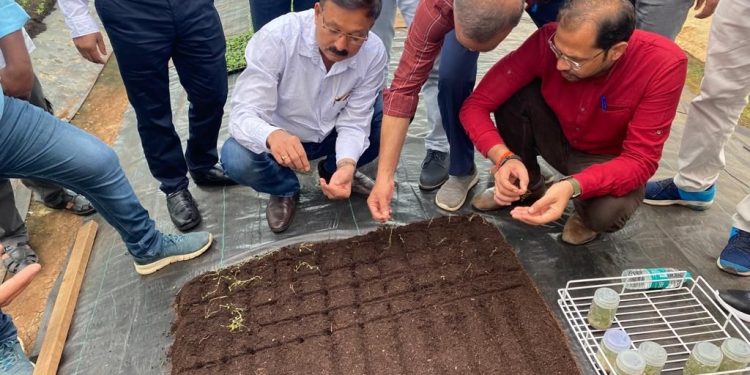#Agriculture #PotatoCultivationARC #AgriculturalResearchCouncil #CropYield #FarmingTechniques #Training #KnowledgeSharing #InternationalPotatoCenter #Bihar #AgricultureUniversity #UHSBagalkot #Farmers #Agronomists #AgriculturalEngineers #Scientists
This article explores the significance of ARC (Agricultural Research Council) in potato cultivation, its multiplication from mother plants, and its impact on G0 production.
Potatoes are a staple crop worldwide, and farmers are constantly seeking innovative techniques to improve their cultivation. Recently, the UHS Bagalkot campus had the privilege of hosting a 20-member team from Bihar, comprising professors, potato scientists, and farmers. The highlight of the day was the hands-on training in the nursery, where the team delved into the intricacies of ARC (Agricultural Research Council) techniques.
ARC has emerged as a game-changer in the world of potato cultivation. It offers a valuable resource for farmers, agronomists, and agricultural engineers, providing them with improved varieties and methods to enhance crop yield and quality. The Bihar team witnessed firsthand the multiplication of ARC from mother plants, gaining insights into the potential of this technique to revolutionize potato farming.
According to recent data from the International Potato Center (CIP), ARC has demonstrated impressive results in several regions. In Karnataka, where the training took place, ARC adoption has led to a significant increase in potato productivity, with an average yield gain of 25% compared to traditional varieties. These figures validate the importance of initiatives like the one organized by the CIP team in Karnataka and Delhi, in collaboration with UHS Bagalkot.
During their visit, the Bihar team also had the opportunity to interact with private nurseries that are actively selling ARC to farmers. Such nurseries play a crucial role in disseminating this groundbreaking technology to a wider farming community, promoting its adoption and ensuring its availability.
Moreover, the visit extended beyond the nursery, allowing the team to witness the actual ARC crop in farmers’ fields. This firsthand experience reinforced their understanding of the practical application and benefits of ARC. By observing the ARC crop’s growth and performance, the Bihar team gained confidence in implementing this technique in their own farms.
IThe day spent at UHS Bagalkot was a memorable and fruitful experience for the team from Bihar. The hands-on training, coupled with visits to private nurseries and farmers’ fields, provided them with valuable knowledge and insights into the potential of ARC in potato cultivation. The collaboration between different stakeholders, including research institutions, agricultural experts, and farmers, is crucial in advancing agricultural practices and empowering farmers to achieve higher yields and sustainable growth.







